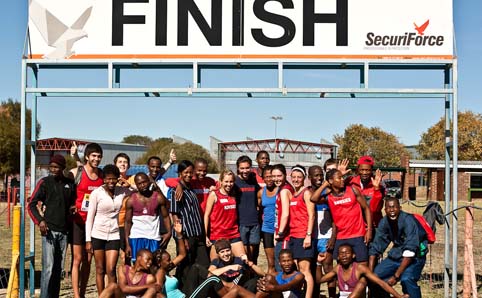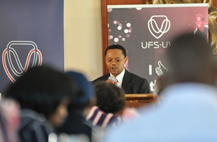Latest News Archive
Please select Category, Year, and then Month to display items
12 January 2024
|
Story Nonsindiswe Qwabe
|
Photo Sonia Small
 Since joining the UFS in 2008, Dr Grey Magaiza has worked extensively on approaches that can foster the socio-economic transformation of societies.
Since joining the UFS in 2008, Dr Grey Magaiza has worked extensively on approaches that can foster the socio-economic transformation of societies.
“The future should be one where communities can decide on their development agenda and futures. That’s the most important for me.” Dr Grey Magaiza, Deputy Director of the Centre for Gender and Africa Studies (CGAS) and Head of the Community Development programme on the Qwaqwa Campus, is passionate about capacitating communities to be agents of change and advancement. His vision for the future emphasises the empowerment of communities to take charge of their development by actively participating in decision making and the implementation of development projects that can improve their lives.
Since joining the UFS in 2008, Dr Magaiza has worked extensively on approaches that can foster the socio-economic transformation of societies. Over the years, he has crafted his research speciality into one that he is most proud of – being an interdisciplinary scientist immersed in the development of communities.
“I’m in a fortunate position of researching what I like. I say ‘fortunate’, because I’ve taken the time to understand what I’m passionate about, which is the overall field of rural livelihoods and livelihood futures – in short, community development. My research starts from an engaged university, understanding the elements that a university must use to enhance transformation and relevance to its immediate community in terms of development.”
One of the ways he has done this is by looking at social entrepreneurship as a development approach for young people in a rural setting. Through workshops with non-profit and civic organisations in Qwaqwa, Dr Magaiza has been helping these organisations to map out their needs and actively meet them through the involvement and support of external role players.
“We understand that communities are part of the national development agenda, but even that national agenda respects community knowledge and intentions and allows communities to shape their identity. A critical enabler of this is community organising. You bring back the capacity in communities to have dialogues on issues affecting them as spaces for engagement, knowledge exchange, and for people to just talk about their way forward.”
By enabling communities to define their development agenda, they can address their specific needs, challenges, and aspirations, he said. “When I look at livelihood futures, it’s quite an exciting aspect of my work – it’s like looking into a fortune tellers’ globe, because you’re not deciding for communities what they should do, but the communities themselves take those decisions.”
Intravarsity brings Kovsie Campuses together
2012-05-09
 |
|
Bloemfontein and Qwaqwa Campuses find each other in sport, arts and culture.
|
|
Intravarsity Photo Gallery
|
|
Intravarsity
Two campuses, one university, students coming together for a weekend filled with sport, arts and culture. That was the backdrop to Intravarsity 2012, which was held at the University of the Free State (UFS) on 4 and 5 May 2012.
Students from the Bloemfontein and Qwaqwa Campuses came together on the Main Campus to compete in soccer, netball, cross-country, basketball, debating and chess.
The Qwaqwa Campus raked up victories in soccer with their men’s and women’s teams beating their Bloemfontein counterparts. The women’s team won 3-2, while the men triumphed with 1-0.
Bloemfontein Campus beat Qwaqwa Campus 34-12 in netball, 2-0 in chess and 36-34 in basketball.
However, Intravarsity is not just about sport. Students from the two campuses also engaged in art, cultural and leadership events. These events included a musical festival with top local DJs and a leadership breakfast attended by the student leadership from both campuses.
Talking at the leadership breakfast, Prof. Kwandiwe Kondlo, Head of the Centre for Africa Studies, urged student leaders to strive for selfless leadership. “We want our student leaders to be better leaders than we are. Perhaps at one moment some of you may end up leading this country. I hope when your time comes you will save South Africa from the democratisation of shamelessness and corruption, which has gained the upper hand.”
Mr Rudi Buys, Dean of Student Affairs, told the student leaders that the institution was in crisis five years ago. “Today our campuses are together. I hope the significance of the weekend is not lost.”
Intravarsity 2012 replaced this year’s Intervarsity. The annual Intervarsity between the UFS and North-West University (NWU) has been postponed to 2013.
|
Kovsie student leaders discuss leadership at Intravarsity
 Student leaders from the Bloemfontein and Qwaqwa Campuses attended a leadership breakfast during the Intravarsity weekend of 4 and 5 May 2012. The breakfast, held on the Main Campus, was hosted by the Division: Student Affairs. Student leaders from the Bloemfontein and Qwaqwa Campuses attended a leadership breakfast during the Intravarsity weekend of 4 and 5 May 2012. The breakfast, held on the Main Campus, was hosted by the Division: Student Affairs.
Taking lessons in leadership from Prof. Kwandiwe Kondlo, Head of the Centre for Africa Studies, the Kovsie student leaders discussed the duties and responsibilities of leadership, not only on our campuses but also throughout the country.
Highlighting the role of student leadership Prof. Kondlo told students they needed to be active partners in building a cohesive and united university.
“Student leadership is important in the life of any university; it creates conditions the university requires for the construction and production of knowledge. This is very important; hence cooperation between student leadership and management is so vital.”
Prof. Kwandiwe Kondlo’s speech that he delivered at the leadership breakfast. (pdf format)
|